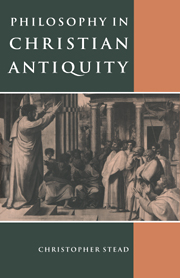Book contents
- Frontmatter
- Contents
- Preface
- List of abbreviations
- PART I THE PHILOSOPHICAL BACKGROUND
- PART II THE USE OF PHILOSOPHY IN CHRISTIAN THEOLOGY
- 8 The debate about Christian philosophy
- 9 Greek and Hebrew conceptions of God
- 10 Proofs of the existence of God
- 11 God as simple unchanging Being
- 12 How God is described
- 13 Logos and Spirit
- 14 Unity of substance
- 15 Substance and Persons
- 16 Christ as God and Man
- 17 Two natures united
- PART III AUGUSTINE
- Bibliography
- Index of Names
- Index of Subjects
10 - Proofs of the existence of God
Published online by Cambridge University Press: 29 September 2009
- Frontmatter
- Contents
- Preface
- List of abbreviations
- PART I THE PHILOSOPHICAL BACKGROUND
- PART II THE USE OF PHILOSOPHY IN CHRISTIAN THEOLOGY
- 8 The debate about Christian philosophy
- 9 Greek and Hebrew conceptions of God
- 10 Proofs of the existence of God
- 11 God as simple unchanging Being
- 12 How God is described
- 13 Logos and Spirit
- 14 Unity of substance
- 15 Substance and Persons
- 16 Christ as God and Man
- 17 Two natures united
- PART III AUGUSTINE
- Bibliography
- Index of Names
- Index of Subjects
Summary
Two basic issues called for philosophical treatment by Christian writers: the proof of God's existence and the question of his nature. It might seem that such debates were ruled out ab initio by the widely accepted principle that we can know that God is, or exists, but can ever know what he is; this appears to make the first exercise unnecessary and the second impossible. But the principle was not consistently followed, even where it was accepted in theory. In the first place, Christian writers appreciated the need to offer some rational justification of their faith; they had to reply to sceptics who denied the possibility of knowledge as such, to propagandists who accused the Christians of unreasoning credulity, and to atheists who denied the existence of any divinity. Secondly, the proposition that God cannot be known was rarely taken in the literal sense it might have for a modern reader; to do so, indeed, would disallow the positive teaching about God which is found in the Bible. It was usually taken to mean that direct or adequate knowledge of God was impossible for men, at least in this life; for the future there was St Paul's promise that we should see him ‘face to face’.
We can thus distinguish three philosophical problems:
The rational defence of the doctrines of faith, of belief in authority, and of the general possibility of acquiring knowledge at all.
Proofs of God's existence.
The nature of God.
- Type
- Chapter
- Information
- Philosophy in Christian Antiquity , pp. 109 - 119Publisher: Cambridge University PressPrint publication year: 1994



